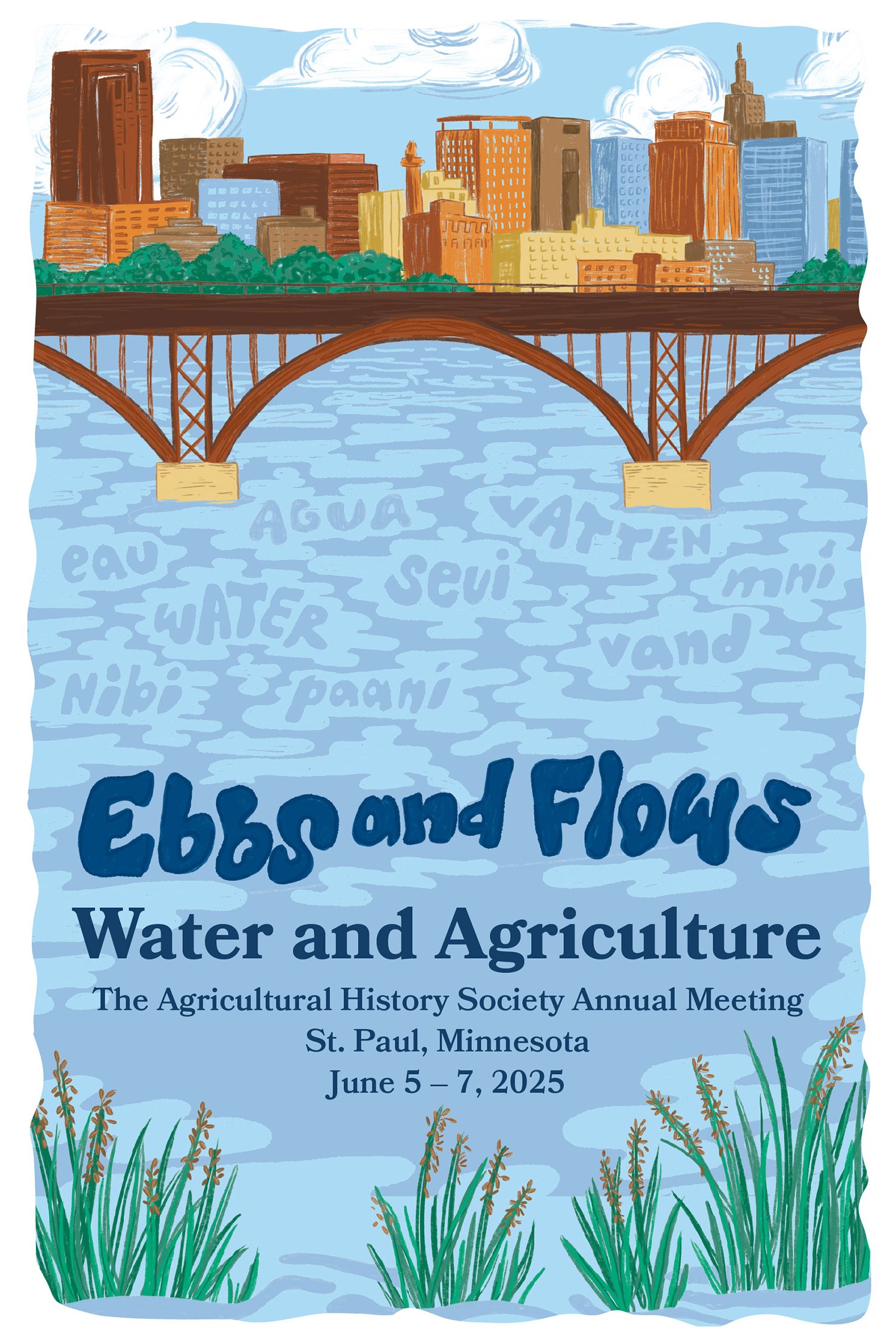CLICK HERE TO GO TO THE 2025 CONFERENCE PAGE
Ebbs and Flows, Water and Agriculture
The 2025 meeting of the Agricultural History Society will convene in St. Paul, Minnesota. As we gather on the banks of the Mississippi River, in the state aptly nicknamed the Land of Ten Thousand Lakes, we invite scholars to engage with the twin themes of water and agriculture.
From its origins thousands of years ago, to its present and future in the context of the climate crisis, agriculture is interlocked with water. Evolutions and revolutions of farming across time and space have paralleled evolutions and revolutions in how human societies have understood and used water in its many forms. Water is a necessary, but also highly contested, element of production. Its relationship with agriculture is profoundly political.
Agricultural historians have long strived to capture the historical complexity of this relationship, and agricultural history serves as an ideal terrain for encounters among a broad range of historiographical approaches and diverse perspectives: from the humanities, sciences, and social sciences; and from within and beyond academia. We envisage this conference as an opportunity to sustain and expand this cross-disciplinary conversation on the water-agriculture nexus.
Possible theme-related proposals might include – but are not limited to – the following topics:
Farming the wetlands, seas, and other watery spaces
Different ways of knowing about water and agriculture and their relationship (e.g. Indigenous knowledge(s), hydro-agricultural scientific knowledge)
Food and place, food security, food sovereignty, sustainability of food/agricultural systems in relation to water
The hydro-politics of agricultural modernization and imperialism
All the various dimensions of water governance and engineering in their relationship with farming (e.g. irrigation, dams, river diversion)
The agriculture of ‘hydraulic societies’ in the longue durée
Water and power (e.g. rural/urban divides, regional/geographic inequalities, rights to food and water, social/economic/political justice movements, conflicts about water and agriculture)
Agriculture, rainfall, and the lack thereof (e.g. histories of drought and aridity)
Agricultural production and environmental degradation (e.g. water pollution, permanent water loss)
More-than-human histories centered on water, agriculture, plants, non-human animals, or diseases
The very nature of this conference theme reinforces the Agricultural History Society's long-standing commitment to inclusive and trans-disciplinary scholarship. The program committee encourages contributions from diverse scholars, researchers, and practitioners covering understudied or underrepresented people, geographical regions, periods, and types of agriculture. We look forward to proposals for individual papers, full panel sessions, posters, and films related to any aspect of agricultural history, broadly defined.
Program Committee:
Rebecca Kaplan, Oklahoma State University (Chair)
Micah Chang, Montana State University
Kristen Greteman, Iowa State University
Hanna Lipsey, Florida Gulf Coast University
Michele Sollai, University of Zurich
Contact Info:
Rebecca Kaplan (rebecca.kaplan@okstate.edu)
Instructions:
Conventional session proposals should include the organizer's contact information, a two-hundred-word abstract for each paper, and a one-page CV for each panel member
Session proposals in other formats (roundtables, workshops, etc.) should include the organizer's contact information, a two-to-three-hundred-word abstract, and a one-page CV for each participant.
Individual paper proposals should consist of contact information, a two-hundred-word abstract, and a one-page CV.
Poster proposals should include contact information, a two-hundred-word abstract, and a one-page CV.
Film proposals should include contact information, a two-hundred-word abstract, a link to the film or trailer if available, and a one-page CV.
Please note that in order to keep conference fees reasonable, this will be a low-tech conference. There will be no projectors, screens, or laptops available in most rooms. If your presentation depends on visuals, please note this in your proposal and we will do our best to accommodate.
All proposals should be submitted electronically in a single file in MS Word format to the Program Committee by email at: rebecca.kaplan@okstate.edu.
Deadline for submissions to the annual meeting has been extended to October 15, 2024.
